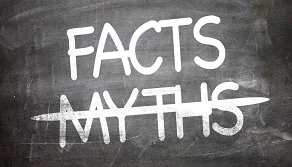Credit Score Myths

With so much information available online, it can be tough to separate fact from fiction. To help you cut through the noise, we’ve busted the eight biggest credit score myths. Remember to check out our product section to see if you can score yourself a better deal.
Myth 1: "Nobody looks at credit scores anyway"
|
This couldn’t be further from the truth. More and more banks, lenders and other credit providers are using your credit score to help them decide whether or not to lend to you, how much they should lend you, and at what interest rate. |
Myth 2: "I can't control my credit score" |
|
Actually, you can! With the introduction of Comprehensive Credit Reporting you now may have the ability to control your credit score. For example, if you pay your bills on time consistently you’re potentially on your way to improving your credit score. |
Myth 3: "I don't need a credit score until I get a loan or a credit card"
|
Having a credit score before you get a loan or credit card may give you the best chance at obtaining the lowest interest rate. Proactively managing your credit score is a good way to stay on top of your financial position. |
Myth 4: "All I need is a Credit Report"
|
Actually, credit reports often do not contain credit scores. This information is often provided separately. Your credit score is a summary of the information provided in your credit report. To obtain a free copy of your free credit report, contact Equifax. |
Myth 5: "All Credit Scores are basically the same"
|
Your score relates to your creditworthiness, based on information held in your credit report at a given point in time. GetCreditScore uses the Equifax credit score, Australia’s most comprehensive and widely used credit score. The Equifax credit score is from 0 to 1200; the higher your score, the better your creditworthiness is likely to be. |
Myth 6: "No debts means a good credit score."
A credit report is a way for credit providers to determine whether you’re a responsible borrower. If you have a blank credit report, this could notify lenders that you haven’t borrowed any money in recent years, and therefore provides no assurance that you are a good loan candidate. What they may want to see is a good credit history, such as regular, on time repayments against your debt.
Myth 7: "My credit score can be improved by using a debit card"
Debit cards and even prepaid cards do not even make an appearance on your credit report, so using them is identical with using cash.
Myth 8: "Checking my own credit report can hurt my credit score."
Not with GetCreditScore it won’t. Credit enquiries fall into two categories: hard and soft. A ‘hard’ enquiry takes place when a lender requests your credit report to assess your creditworthiness. A ‘soft’ enquiry happens when you make an enquiry into your own credit score or report. Hard enquiries often have a negative impact on your credit score, but soft ones don’t. In fact, monitoring your credit score, and checking your own credit report is good practice as it gives you a chance to correct any mistakes the reporting bodies might have made. You can request your free credit report through Equifax here.
